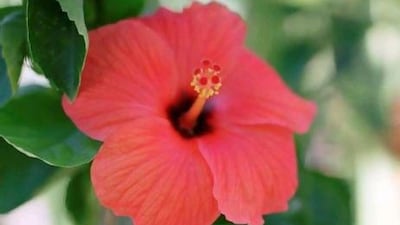Hibiscus rosa-sinensis, China rose, queen of the tropics Hibiscus rosa-sinensis is one of the most popular of the 250 or so species that comprise the genus Hibiscus. This species alone has around 6,000 registered named cultivars and varieties.
The main reason for its popularity is its brightly coloured, eye-catching blooms, each of which only lasts a day. But a steady succession of flowers ensures near continuous colour throughout the winter months.
The tropical hibiscus can be grown as a shrub but also makes an excellent container plant. If it is grown in this way, replanting and root pruning are recommended at least every three years or when the plant becomes pot-bound. This Hibiscus prefers rich soil but will grow well in sand as long as it is regularly fertilised with a balanced feed.
Unfortunately, Hibiscus rosa-sinensis is susceptible to a wide variety of pests, including spider mites, which cause a mottled yellowing of the leaves, and thrips, which cause bud drop, as well as white flies and fungus gnats. In early 2000, a mealy bug infestation spread throughout the region with devastating effect. This also affected the use and popularity of the plant.
The single form of Hibiscus rosa-sinensis with the five-petaled blood-red blooms is Malaysia's national flower and is known as Bunga Raya in the Malay language.

